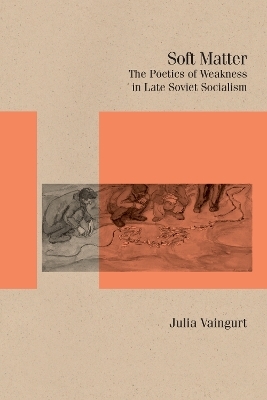
Soft Matter
Northwestern University Press (Verlag)
978-0-8101-4815-4 (ISBN)
- Noch nicht erschienen (ca. Januar 2025)
- Versandkostenfrei innerhalb Deutschlands
- Auch auf Rechnung
- Verfügbarkeit in der Filiale vor Ort prüfen
- Artikel merken
Identifies and examines a poetics of weakness in Soviet underground literature Artists of the late Soviet era sought new, nonconformist ways of approaching literary fiction, arriving at weaknessas a crucial principle of narrative and character formation. Julia Vaingurt argues that this counter-discourse of strategic weakness constituted both an aesthetic strategy and an ethical code, affording like-minded authors a feeling of recognition and commonality and uniting an international community of artists in resistance to the divisiveness of their worlds. Soft Matter: The Poetics of Weakness in Late Soviet Socialism explores the cultivation of weak subjectivity through modes such as gender subversion, queer holy foolishness, intoxication, madness, and writing disorders like graphomania and writer’s block. Identifying the poetics of weakness as formative for Soviet underground literature of the 1960s and ’70s, Vaingurt also traces the inheritance of a far older tradition within Russian culture of salutary weakness. As democratic deliberation continues to be under threat around the world, alternatives to the ubiquitous politics of force are an aesthetic, ethical, and ideological imperative.
Julia Vaingurt is a professor in the Department of Polish, Russian, and Lithuanian Studies at the University of Illinois Chicago. Her previous books include Wonderlands of the Avant-Garde: Technology and the Arts in Russia of the 1920s, also published by Northwestern University Press.
Illustrations
Introduction
Chapter 1. A Typology of Weakness: Lacking Heroes in Literature and Film
Chapter 2. Iulii Kim’s Cinderella in the Concentration Camp: Performing Kurt Vonnegut’s Gender Subversion in the USSR
Chapter 3. “What a Hero of Weakness!”: The Radical Orthodoxy of Evgenii Kharitonov
Chapter 4. “Universal Chicken-heartedness”: Low Spirits and Immoderate Meditations in Venedikt Erofeev’s Moskva-Petushki
Chapter 5. Enjoy Your Symptom!: Sasha Sokolov’s A School for Fools as an Artist’s Guide to Psychosis
Chapter 6. The Weakling, the Genius, the Bomb, and the Globe: Writing as Weakness in Andrei Bitov
In Conclusion: A Manifesto
Works Cited
| Erscheint lt. Verlag | 15.1.2025 |
|---|---|
| Reihe/Serie | Studies in Russian Literature and Theory |
| Zusatzinfo | 15 b&w halftones |
| Verlagsort | Evanston |
| Sprache | englisch |
| Maße | 152 x 229 mm |
| Gewicht | 454 g |
| Themenwelt | Geisteswissenschaften ► Philosophie ► Erkenntnistheorie / Wissenschaftstheorie |
| Geisteswissenschaften ► Sprach- / Literaturwissenschaft ► Anglistik / Amerikanistik | |
| Geisteswissenschaften ► Sprach- / Literaturwissenschaft ► Literaturwissenschaft | |
| Sozialwissenschaften | |
| ISBN-10 | 0-8101-4815-3 / 0810148153 |
| ISBN-13 | 978-0-8101-4815-4 / 9780810148154 |
| Zustand | Neuware |
| Informationen gemäß Produktsicherheitsverordnung (GPSR) | |
| Haben Sie eine Frage zum Produkt? |
aus dem Bereich

![Was heißt Denken?. Vorlesung Wintersemester 1951/52. [Was bedeutet das alles?] - Martin Heidegger](/media/113619842)
